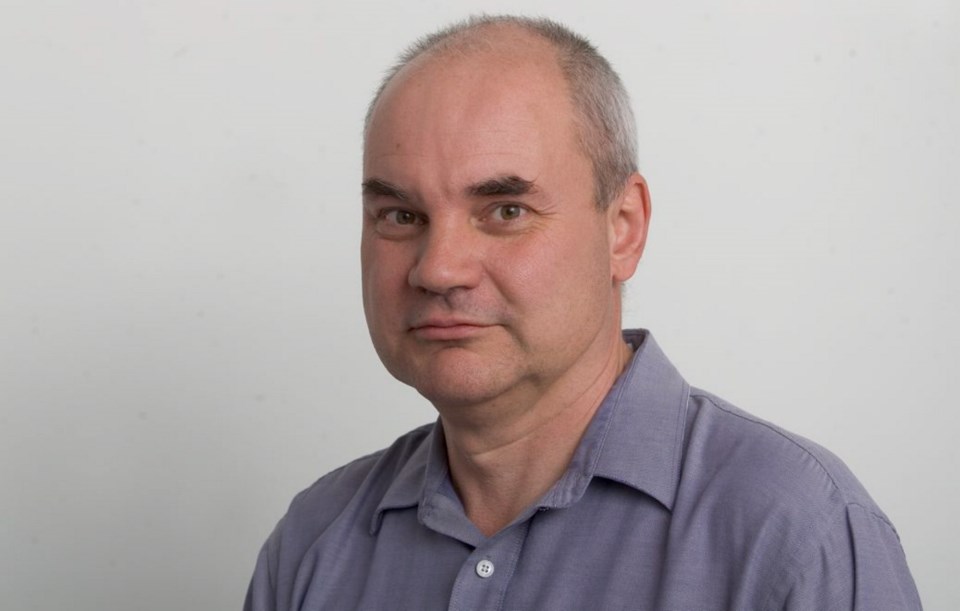Somebody spent 12/12/12 scattering doomsday DVDs around downtown Victoria.
Our pal Ian Ferguson spotted half a dozen discs, all labelled For Your Eyes Only, as he strolled down Broad Street. Curious, he pulled one off the sill of Pagliacci’s, opened it on an old computer.
“It was all about the world coming to an end on Dec. 21.” Fifteen minutes of TV clips of end-of-days predictions, nuclear explosions, your garden-variety apocalyptic stuff — the digital equivalent of the placard-waving guy yelling “Repent!” on the streetcorner.
It’s not just Victoria, of course. All over the world, people are bracing themselves for next Friday’s Mayan Meltdown. Not since the Canadian women’s rugby team posed naked has a calendar caused such a fuss.
Survival shelters are selling like handguns in the U.S. Two Chinese men have built arks. France, in a scene out of Close Encounters of the Third Kind, is trying to stop the tinfoil chapeau crowd from scaling Pic de Bugarach, a mountain from which hidden aliens are supposed to emerge on the big day.
Which should give Canadian astronaut Chris Hadfield the best seat in the house when the Earth turns into a pumpkin. You might recall Hadfield from a column earlier this week as he prepared to pilot a Russian Soyuz rocket to a five-month stay on the International Space Station.
“We’re going to be docking on the day the world ends,” the former Royal Roads Military College student said, on the phone from Kazakhstan.
The astronaut had an intriguing explanation for the Mayan madness: “People want significance in their lives,” he said. “They want to know their time has mattered.
“Everyone wants their 75 or 80 years on Earth to be the most significant ones in history. … And what could make our time on Earth more significant than if the world ended while we were alive?”
Hence the current hoopla — “a cry for significance.”
That’s one way of putting it. Here’s another: irrational conceit. The Earth has been spinning for something like 4.5 billion years. What makes us so special that it should screech to a halt in our lifetime? You need a Toronto-sized sense of self-importance to swallow that one.
It’s like the nervous Nellie panic that spread like anthrax after 9/11, everyone expecting al-Qaeda to strike in their own backyard. “B.C. Ferries is vulnerable to terrorist attack! Our seaplanes could be hijacked!” Yes, but “could” doesn’t mean “will.” Osama wasn’t holed up in a cave, going, “Our next targets are the White House, the United Nations and the Queen of Nanaimo.”
The same thought process drives those who predict the world will end on their watch. In 1980, for example, televangelist Pat Robertson guaranteed “judgment on the world” by the end of 1982.
This leaves the soothsayers playing human GPS — recalculating, recalculating — when the world fails to end at the appointed hour. Those who believe predictions that Dec. 21 will see the Earth bowling-balled by the planet Niburu should remember that the strike was originally expected in May 2003.
Likewise, Kentucky televangelist Ronald Weinland, having forecast the Second Coming for this past May 27, has rescheduled for May 19, 2013 (though by then he is due to be in jail on tax-evasion charges).
Also remember that radio preacher Harold Camping had a strikeout in 1994 before settling on May 21, 2011. He reportedly spent $100 million advertising May’s demise worldwide. (Tragically, none of it was spent at the Times Colonist.) After that deadline passed, he reset the dial to Oct. 21, 2011. We’re still waiting.
The problem is, while we’re waiting for something significant to happen we forget to do anything significant.
That’s not to be confused with fame. “There’s a lot of fleeting fame, whether you’re a monkey in a shearling coat, or whatever the current excitement is,” Hadfield said. Fame is not important. Leading a life with meaning is. For him, that means exploring the sky, not hoping it will fall.
As coincidence would have it, astronaut Hadfield and author Ferguson spent an enjoyable night in the bar together after appearing at the same literary festival in Ontario in 2010. Small world, eh? Hope it doesn’t blow up.



